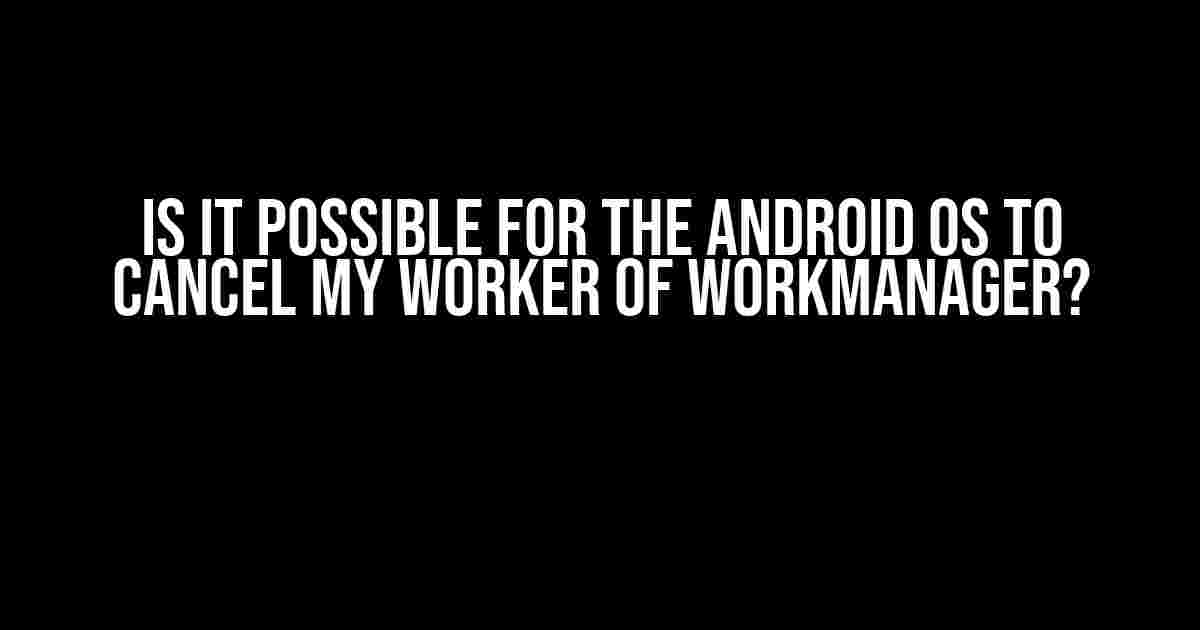As an Android developer, you’re probably no stranger to the world of WorkManager and its ability to execute tasks in the background, even when your app is closed or the device is rebooted. But have you ever wondered: is it possible for the Android OS to cancel your Worker?
The Short Answer: Yes, but…
The Android OS can indeed cancel your Worker, but it’s not as simple as just saying “yes” or “no”. There are specific circumstances under which this can happen, and understanding these circumstances is crucial to ensuring your app’s background tasks are executed as intended.
Why Would the Android OS Cancel my Worker?
There are several reasons why the Android OS might cancel your Worker:
- System Resource Constraints: If the system is running low on resources such as memory, CPU, or battery, the OS might cancel your Worker to free up resources for more critical tasks.
- App Updates: When your app is updated, the OS might cancel any running Workers to ensure a smooth transition to the new app version.
- Device Reboot: When the device is rebooted, all running Workers are cancelled to prevent any potential conflicts with the system startup process.
- User Intervention: Users can explicitly cancel a Worker by revoking the app’s permission to run in the background or by uninstalling the app.
How to Handle Worker Cancellation
So, what can you do to handle Worker cancellation and ensure your app’s background tasks are executed as intended?
1. Implement Retry Mechanisms
One way to handle Worker cancellation is to implement retry mechanisms. This involves setting a retry policy for your Worker, which will attempt to re-run the task if it’s cancelled or fails.
WorkManager workManager = WorkManager.getInstance(context);
RetryPolicy retryPolicy = new RetryPolicy(RetryPolicy.RETRY_OVERindexed, 3000);
OneTimeWorkRequest request = new OneTimeWorkRequest.Builder(MyWorker.class)
.setRetryPolicy(retryPolicy)
.build();
workManager.enqueue(request);
2. Use idempotent Operations
Another approach is to design your Worker to perform idempotent operations. This means that even if the Worker is cancelled, re-running the task won’t cause any issues.
public class MyWorker extends Worker {
@Override
public Result doWork() {
// Perform idempotent operation, such as sending a notification or updating a database
return Result.success();
}
}
3. Handle User Intervention
If the user explicitly cancels a Worker or revokes the app’s permission to run in the background, you should handle this scenario by providing a clear explanation to the user and offering an option to re-enable the background task.
public class MyWorker extends Worker {
@Override
public Result doWork() {
// Check if user has revoked permission to run in background
if (!hasBackgroundPermission()) {
// Display explanation and option to re-enable background task
showExplanationDialog();
return Result.failure();
}
// Otherwise, perform background task
return Result.success();
}
}
Best Practices for Using WorkManager
To minimize the chances of your Worker being cancelled, follow these best practices:
| Best Practice | Description |
|---|---|
| Set a unique name for your Worker | Use a unique name for your Worker to prevent conflicts with other Workers or system tasks. |
| Use a reasonable delay for retry | Set a reasonable delay between retries to avoid overwhelming the system with repeated attempts. |
| Handle exceptions and errors | Capture and handle exceptions and errors to prevent your Worker from crashing or being cancelled. |
| Monitor Worker status | Use WorkManager’s APIs to monitor the status of your Worker and respond accordingly. |
Conclusion
In conclusion, while it is possible for the Android OS to cancel your Worker, understanding the circumstances under which this can happen is crucial to ensuring your app’s background tasks are executed as intended. By implementing retry mechanisms, using idempotent operations, and handling user intervention, you can minimize the impact of Worker cancellation and provide a seamless experience for your users.
Additional Resources
For further information on WorkManager and background tasks, check out these resources:
By following these guidelines and best practices, you’ll be well on your way to creating reliable and efficient background tasks that ensure a great user experience.
Frequently Asked Question
Get the answers to your burning questions about Android OS and Workmanager!
Can Android OS cancel my worker in Workmanager?
Yes, Android OS can cancel your worker in Workmanager under certain circumstances. When the system is low on resources or needs to reclaim memory, it can stop or cancel your worker to ensure the overall system performance and user experience.
Will my worker be cancelled when the app is closed or terminated?
Not necessarily! Workmanager is designed to run tasks even when the app is closed or terminated. As long as you’ve set up your worker correctly, it will continue to run in the background, unless the system needs to reclaim resources, as mentioned earlier.
How can I handle worker cancellation in Workmanager?
You can handle worker cancellation by overriding the `onStopWork()` method in your `Worker` class. This method is called when the system cancels your worker, allowing you to clean up any resources and handle any necessary logic.
Can I prevent my worker from being cancelled by Android OS?
Unfortunately, you can’t completely prevent your worker from being cancelled, as this is a system-level decision. However, you can increase the chances of your worker completing its task by setting the correct `Constraints` and `WorkRequest` options, such as setting a high priority or specifying a deadline.
What happens to my worker when the device is rebooted?
When the device is rebooted, your worker will be cancelled and restarted from scratch. Workmanager provides a built-in mechanism to store and retry failed tasks, so you can use this feature to ensure your worker is retried after a reboot.
